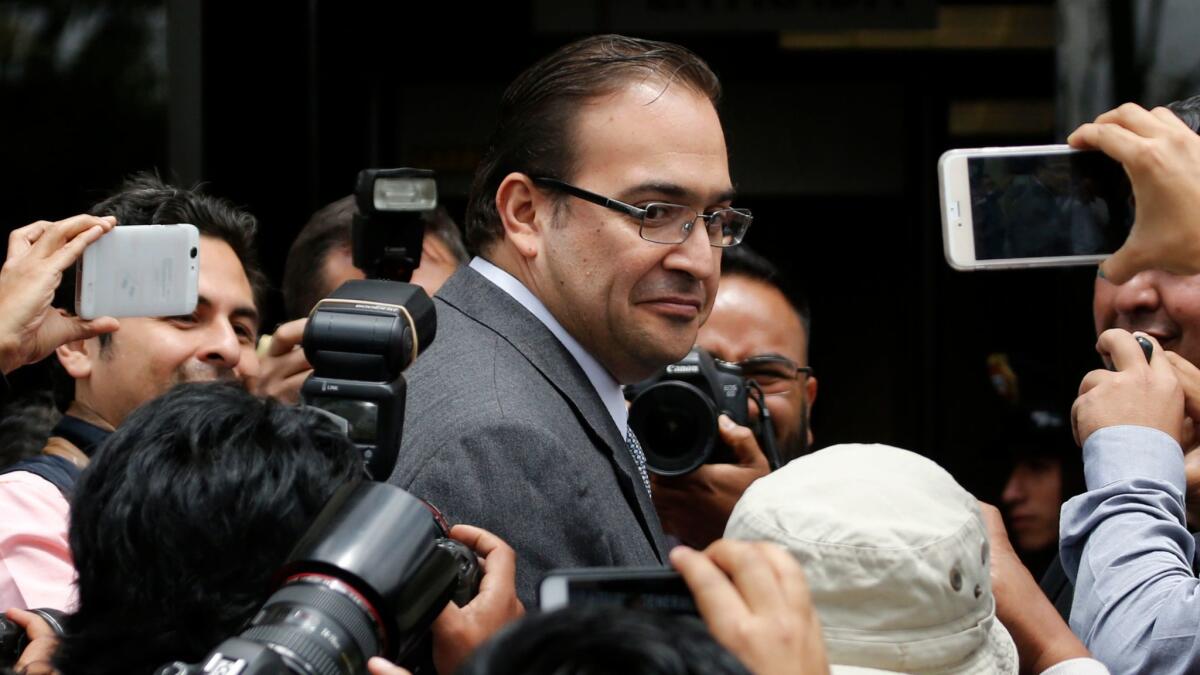Manhunt launched for former Mexican governor charged with corruption

- Share via
Reporting from mexico city — He was once a luminary of Mexico’s ruling party, the governor of a strategic and wealthy state that is a key source of campaign funds for the long-dominant Institutional Revolutionary Party.
Leading national politicians, including President Enrique Peña Nieto, sought him out, despite rumors of corruption and a rising tide of violence and human rights abuses in the Mexican gulf state of Veracruz, where various drug cartels battle for dominance.
Now, former Veracruz Gov. Javier Duarte is a fugitive, accused of money laundering, involvement with organized crime and various alleged acts of fraud, including setting up shell companies to divert public funds for his private use.
On Friday, Mexican authorities announced a reward of 15 million pesos (about $730,000) for information leading to the arrest of Duarte, who stepped down from the governor’s post on Oct. 12, six weeks before the end of his six-year term.
At the time of his resignation, the 43-year-old Duarte publicly vowed a robust fight against swirling allegations of wrongdoing, asserting his innocence. Instead, the onetime power-broker took a powder.
He’s become a symbol of ingrained institutional corruption in Mexico.
Opposition politicians, including Miguel Angel Yunes, the governor-elect of Veracruz, have publicly questioned how Duarte was able to vanish despite an ongoing corruption investigation. Mexican authorities denied giving Duarte an opportunity to decamp.
Critics say state administrations in Mexico are often rife with corruption, allowing governors to amass great wealth and dole out patronage contracts and jobs to cronies and political supporters.
As the presidential candidate in 2012 of the ruling party, known as the PRI, Peña Nieto spoke glowingly of a “new generation” of PRI leaders, naming three then-sitting governors—Duarte in Veracruz, Roberto Borge in the southeastern state of Quintana Roo and Cesar Duarte (no relation to Javier Duarte) in the northern state of Chihuahua.
Four years later, Duarte is on the run and the other two former PRI stalwarts have become embroiled in corruption allegations.
The reward announcement for Duarte comes a day after an arrest in a separate case involving allegations of official corruption at the gubernatorial level.
On Thursday, Guillermo Padres, former governor of northern Sonora state, which borders Arizona, turned himself in to authorities on pending corruption charges.
Padres, who had been a fugitive, surrendered to authorities after giving a radio interview early Thursday denying the allegations. He said he was turning himself in voluntarily.
“I go with my head held high,” Padres told a radio interviewer, before heading off to present himself to Mexican authorities.
Padres, a member of the opposition National Action Party, was governor of Sonora from 2009 to 2015.
The two cases, involving Mexico’s two major political parties, illustrate how allegations of corruption can be a bipartisan affair in Mexico.
In Padres’ case, investigators say they traced $8.8 million in overseas accounts in the governor’s name. Prosecutors also outlined an alleged scheme to direct millions of dollars worth of contracts for school uniforms to companies linked to Padres.
The government inquiry into Duarte was triggered by an investigation by a news website, Animal Politico. The site found that the Veracruz government issued dozens of public contracts for services that were never delivered.
Duarte is suspected in a broad scheme that involves the siphoning off of millions of dollars in government funds paid to a series of shell companies.
Media accounts in Mexico in recent weeks have shed light on various properties reportedly linked to Duarte, including estates in Veracruz, apartments and houses in Mexico City and environs, and other properties in the United States.
When the allegations first arose, a defiant Duarte declared publicly that he had not taken “one cent” of government money. But the scandal eventually resulted in his expulsion from the ruling party.
Before being elected governor in 2010, Duarte had served as a federal congressman from Veracruz and as secretary of finance in the administration of his predecessor, Fidel Herrera.
In addition to the corruption allegations, Duarte has been widely blamed for bloating the state debt in Veracruz and failing to curb rising violence, often linked to competing drug cartels. Human rights activists have also assailed his record, citing the deaths of more than a dozen Veracruz journalists during his term.
In one of the most notorious cases, a Veracruz photojournalist, Ruben Espinoza, and a Veracruz student activist, Nadia Vera, were among five people murdered in an apartment in Mexico City in July 2015. Eight months before the killings, Vera taped an interview saying that if anything amiss were to happen to her or other allied activists, Duarte would be responsible.
The unpopularity of Duarte contributed to the ruling party’s loss of Veracruz state in gubernatorial elections last June, a staggering blow for the ruling party. The Institutional Revolutionary Party had controlled Veracruz for more than eight decades..
During the heated electoral contest, Yunes, from the opposition National Action Party, made punishing Duarte for his alleged corruption a centerpiece of his campaign. Duarte alleged that Yunes was the corrupt one and compared him to Joaquin “El Chapo” Guzman, the jailed drug cartel leader.
Cecilia Sanchez of the Times Mexico City bureau contributed.
ALSO
‘Mexico is one big cemetery’: The search for the secret graves of ‘the disappeared’
Can Trump fulfill his campaign promises on immigration and trade? Mexico hopes not
More to Read
Sign up for Essential California
The most important California stories and recommendations in your inbox every morning.
You may occasionally receive promotional content from the Los Angeles Times.








